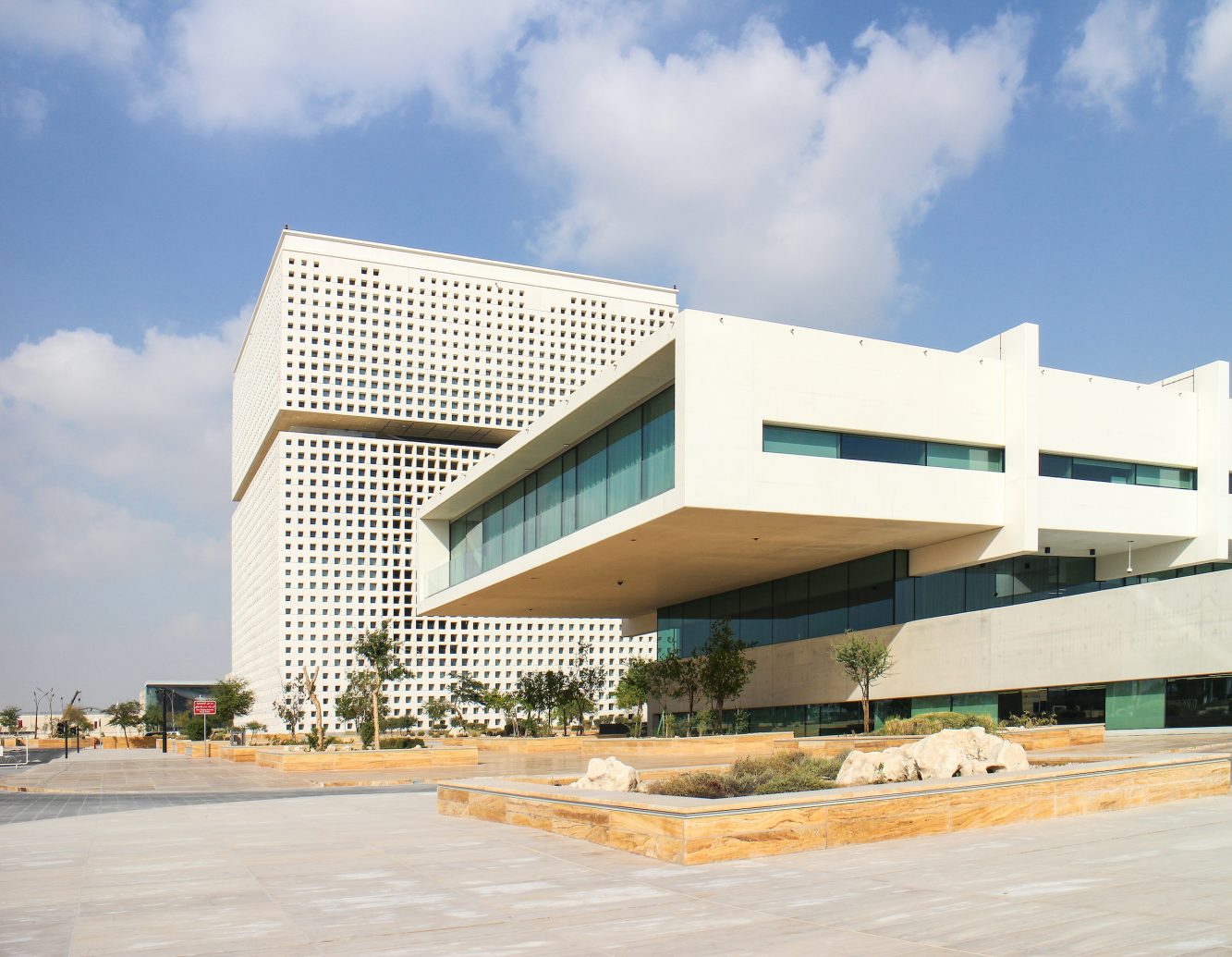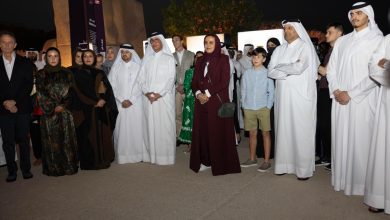QF Organizes Series of Events within UN Global Goals Week
مؤسسة قطر تنظم عددا من الفعاليات بمناسبة أسبوع الأهداف العالمية للأمم المتحدة
QNA
Doha: Qatar Foundation for Education Science and Community Development (QF) organized a series of virtual events as part of its contribution to the UNs 2021 Global Goals Week, held on the sidelines of the UN General Assembly.
QF brought together experts from its ecosystem and around the world to discuss impact investment in edtech, and whether “digital credentialing” and skills recognition systems can make young people more workforce ready.
In a session on youth and decision-making, Stavros Yiannouka, CEO of WISE an initiative dedicated to shaping the future of education through innovation and collaboration – emphasized the need for education systems to focus on “scientific literacy, reason, and applied ethics”.
“Young people actively need to engage without taking to the streets,” Yiannouka said. “Bodies like the UN and its constituent agencies need to take the lead in facilitating that engagement, and giving young people a real voice in decision-making that goes beyond invitations to high-profile activists to occasionally address world leaders. We need to give the youth a seat at the table and an opportunity to help set the agenda.”
Yiannouka argued that, while instilling traits such as agility and resilience in young people is valuable, it does not equip them to influence policy. “We urgently need to create a common intellectual and ethical problem-solving framework, and that will only come if our education systems prioritize scientific literacy, reason, and applied ethics,” he said.
The discussion also heard from Roya Mahboob, CEO of the Digital Citizen Fund – a non-profit organization that helps women and girls in developing countries gain access to technology who said: “The urgency of climate change, food security, and other crises forces us to think outside the box, and the youngest scientists of today offer innovative solutions to age-old problems.”
“Our youngest minds are able to envision solutions, not only at the frontier of science, but also at the frontier of diplomacy and social justice. There is no better way to improve young minds by giving them access to education future economic stability depends on the workforce that will come from the young people of today,” she said.
In the edtech investment panel session, Robert Hawkins, Global Lead for Technology and Innovation in Education, World Bank, said: “Weve seen an incredible increase in lending demand for edtech as a result of school closures due to COVID-19, countries are looking for ways to reach children who are not in school, whether in urban or rural areas.
“If we think about designing edtech solutions for the most marginalized first, they will be more easily scalable to the entire population. Another important aspect is designing programs that meet the needs of end users finding out from teachers and students and schools what their needs are, how they use technology, and what are their bottlenecks,” he said.
Hawkins also pointed out that online learning in itself cannot fully replace face-to-face learning, saying: “Going forward, a lot of work needs to be done on hybrid models based not on technology, but on human connections.”
Meanwhile, the panel discussion on digital credentialing and skills recognition saw Brandon Busteed, Global Head for Learn-Work Innovation at US educational services provider Kaplan, say: “Employers value the broadly-educated student but are also looking for those who are specifically skilled, and we have put ourselves in a dangerous position by talking about it being a case of alternative credentials or degrees employers want both.”
“There are promising signs: more conversations than ever about the importance of skills, a movement among employers that lifelong learning will be critical to their success in terms of both financial performance and attracting workers, and schools and universities increasingly thinking about their role in providing education that is non-degree and non-accredited. The issue is that were not moving fast enough, and the real question is how quickly we can scale these things,” he added.
قنا
الدوحة: عقدت مؤسسة قطر للتربية والعلوم وتنمية المجتمع عددا من الجلسات والفعاليات الافتراضية ضمن أسبوع الأهداف العالمية للأمم المتحدة المنعقد على هامش انعقاد الجمعية العامة للأمم المتحدة 2021.
وجمعت المؤسسة في هذه الجلسات نخبة من الخبراء من منظومة المؤسسة ومن شتى أنحاء العالم لمناقشة مواضيع الاستثمار المؤثر في التقنيات التعليمية، ودور أنظمة التعرف والتحقق الرقمي في فتح آفاق جديدة أمام الشباب وتعزيز جاهزيتهم للانضمام للقوى العاملة.
ففي الجلسة المتمحورة حول الشباب وصناعة القرار، أكد السيد ستافروس يانوكا، الرئيس التنفيذي لمؤتمر القمة العالمي للابتكار في التعليم “وايز”، إحدى مبادرات مؤسسة قطر العالمية في التعليم، على وجوب إيصال أصوات الشباب والإصغاء لهم دون حاجتهم للمطالبة بذلك، ويتعين على الأمم المتحدة أن تأخذ زمام المبادرة لضمان إشراك الشباب في النقاشات الكبرى، مشددا على ضرورة أن تركز الأنظمة التعليمية على جوانب “المعرفة العلمية، والتفكير المنطقي والأخلاق التطبيقية.
وتحدث يانوكا عن أهمية غرس المرونة والتكيف لدى الشباب كسمات ذات قيمة، موضحا أن هذه السمات وحدها لا تكفي لجعلهم مؤهلين للتأثير على السياسات، وقال:” نحتاج إلى وضع إطار فكري وأخلاقي لحل المشكلات، وهذا سيكون ممكنا فقط إذا عملت أنظمتنا التعليمية على إعطاء الأولوية للمعرفة العلمية، والتفكير المنطقي والأخلاق التطبيقية، فإذا كنا بالفعل نتطلع إلى حماية شباب المستقبل من خلال التعليم، علينا أن نضمن وجود هذه الأساسيات. في الحقيقة، نحن بعيدون عن ذلك حتى في الاقتصادات الأكثر تقدما في العالم”.
في الإطار ذاته لفتت السيدة رؤيا محبوب، الرئيس التنفيذي لصندوق المواطن الرقمي?- وهو منظمة غير ربحية تدعم النساء في الدول النامية للوصول إلى التكنولوجيا، إلى أن القضايا الملحة مثل تغير المناخ والأمن الغذائي وغيرها من الأزمات تفرض علينا أن نفكر خارج الصندوق، والعلماء الشباب اليوم يقدمون حلولا مبتكرة لمشكلات عانينا منها فيما مضى.
وأضافت أن هذه العقول الشابة تتصور الحلول، ليس فقط فيما يتعلق بالجوانب العلمية، ولكن أيضا على مستوى الجوانب الدبلوماسية والعدالة الاجتماعية، وأفضل طريقة لتطوير عقول الشباب هي من خلال توفير الوصول إلى التعليم، كما أن الاستقرار الاقتصادي في المستقبل يعتمد على القوى العاملة التي يشكلها شباب اليوم.
وخلال الجلسة المتعلقة بالاستثمار المؤثر في التقنيات التعليمية بين السيد روبرت هوكينز، الرئيس العالمي للتكنولوجيا والابتكار في التعليم، البنك الدولي، أن هناك زيادة هائلة في الطلب على الإقراض من أجل التقنيات التعليمية، وكنتيجة إغلاق المدارس إثر جائحة كوفيد-19، تبحث الدول عن طرق للوصول للأطفال غير الملتحقين بالمدارس ، سواء في المناطق الحضرية أو الريفية.
وشدد على ضرورة تصميم حلول للتقنيات التعليمية للفئات المهمشة أولا، حتى يكون من السهل توسيع نطاقها ليشمل الجميع. ومن الجوانب الأخرى الهامة تصميم البرامج التي تلبي احتياجات المستخدمين النهائيين، من خلال التعرف على احتياجات المعلمين والطلاب والمدارس، وطرق استخدامهم للتقنيات التكنولوجية والعقبات التي تواجههم.
وأشار هوكينز إلى أن نظام التعلم عبر الإنترنت لا يمكنه أن يحل محل التعلم المباشر، قائلا “مازلنا نواجه فجوة كبيرة في الوصول الرقمي، وهو ما كشفت عنه جائحة كوفيد-19، لذلك يتعين علينا مضاعفة التفكير في نماذج التقنيات التعليمية التي تشمل وسائل اتصال مختلفة.”
وبالنسبة للجلسة النقاشية حول أنظمة التعرف والتحقق الرقمي فقد نبه السيد براندون?بوستيد، الرئيس العالمي?للابتكار في التعلم والعمل بشركة “Kaplan”?للخدمات التعليمية الأمريكية، إلى أن أرباب العمل يقدرون الأفراد المتعلمين على نطاق واسع، ولكنهم يبحثون أيضا عن من يتمتعون بمهارات خاصة، مضيفا أن هناك إشارات واعدة، مثل ازدياد النقاشات حول أهمية التمتع بالمهارات مقارنة بأي وقت مضى، وإدراك أرباب العمل لأهمية التعلم مدى الحياة لتحقيق النجاح على مستوى الأداء المالي واستقطاب الموظفين، إلى جانب إدراك المدارس والجامعات لدورها في توفير التعليم الذي لا يعتمد على الدرجات العلمية.




